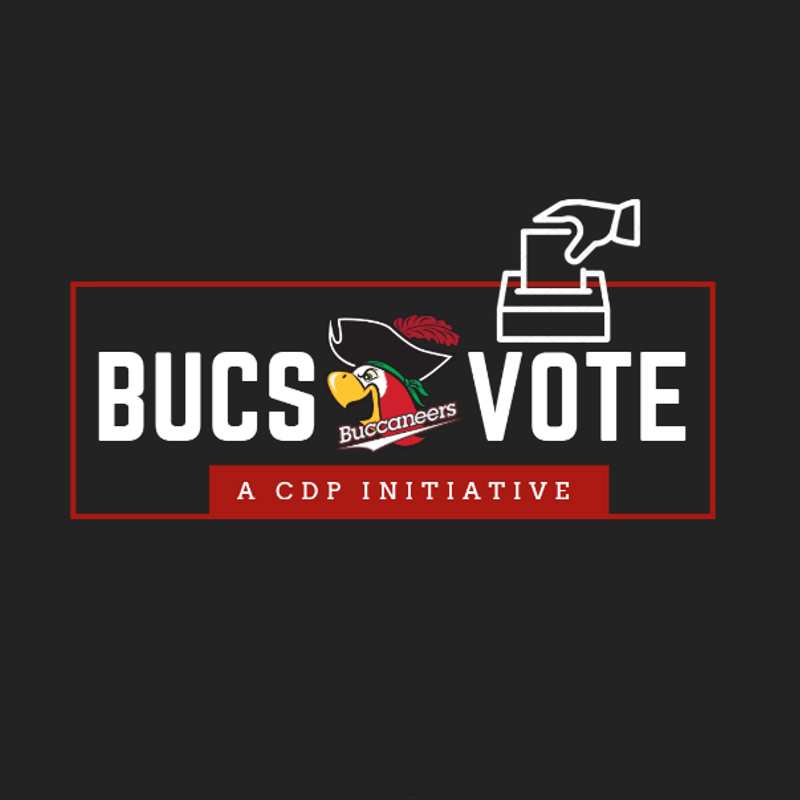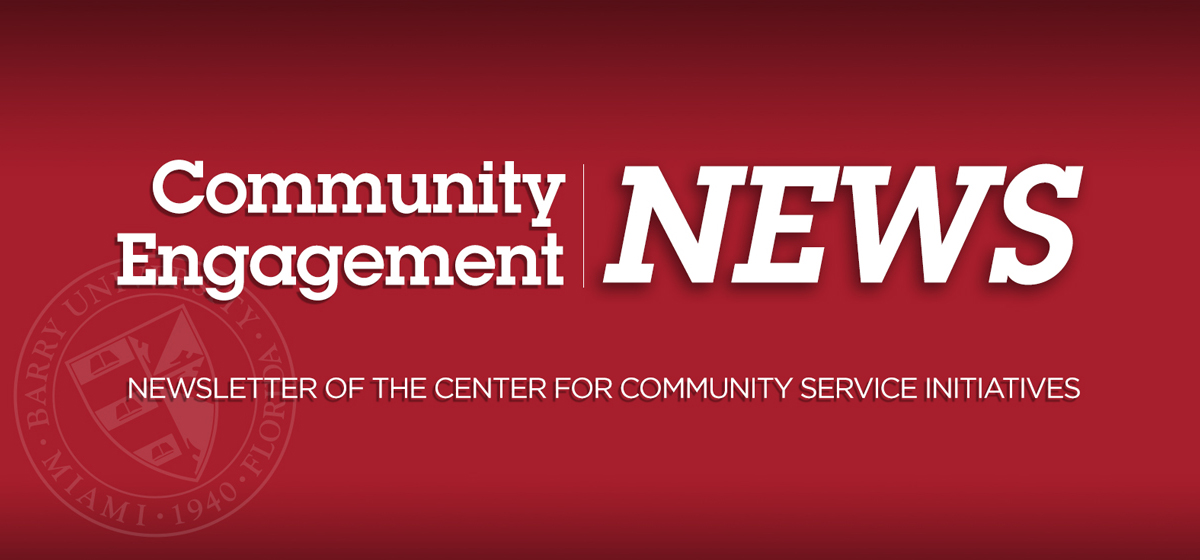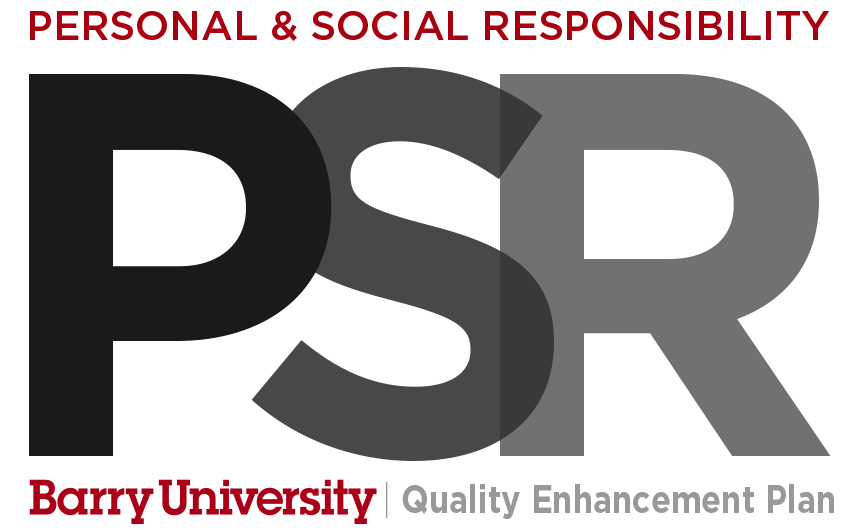September 28, 2020
IN THIS ISSUE
- Students Contribute to Campaigns Advocating Increased Attention to Environmental Health
- Dr. Tamara Hamilton is Now Chair of the Service-Learning Designation Committee
- University Celebrates Constitution Day with Forum on the Right to Protest Peacefully
- Deliberative Dialogue Series Focused on Race Matters Continues on October 22
- Campus Democracy Project Sponsor Provides Nonpartisan Student Voter Guide
- Community Service Placements Available to Students Eligible for Federal Work-Study
- Community Engagement Calendar is Chock-full of Events; Other News You May Have Missed
Students Contribute to Campaigns Advocating Increased Attention to Environmental Health
Two community partners provide opportunities on service day


Protect Florida's Reefs

End Sewage Leaks

Stop FPL's Turkey Point Nuclear Power Plant Pollution

Glyphosate

Reduce Fertilizer Runoff

Fish Kill and Algae Bloom
Students visited the Miami Waterkeeper website, where they signed petitions in support of these six campaigns. Miami Waterkeeper and Historic Virginia Key Beach Park were Barry’s community partners for International Coastal Cleanup Day, the first major day of service on the university’s community engagement calendar for this academic year.
Barry students have contributed to campaigns advocating increased attention to environmental health. This is the main outcome of International Coastal Cleanup Day (Sept. 19), when two community partners drew students’ attention to the urgent need for protection and preservation of South Florida’s watershed and marine life.
After learning from Miami Waterkeeper (MWK) about its environmental campaigns, the students visited the MWK website, where each signed at least one petition in support of a campaign. In addition, students emailed local officials, requesting their attention to issues raised in the MWK campaigns, and some students posted information about the campaigns on social media.
MWK’s mission is “to defend, protect, and preserve South Florida’s watershed through citizen engagement and community action rooted in sound science and research.” Serving more than 4.5 million people across Miami-Dade and Broward counties, the agency works “to ensure swimmable, drinkable, fishable water for all” and supports “a vibrant and resilient South Florida coastal community and environment for future generations.”
Casey Dresbach, MWK’s community engagement coordinator, discussed clean water, habitats, and sea-level rise as the three focus areas for her agency. Then she outlined the six current campaigns: (1) Protect Florida's Reefs, (2) End Sewage Leaks, (3) Stop FPL’s Turkey Point Nuclear Power Plant Pollution, (4) Ban the herbicide Glyphosate, (5) Reduce Fertilizer Runoff, and (6) Address Fish Kill and Algae Bloom in Biscayne Bay.
MWK describes the scope of its work as “diverse.” The agency’s approach combines education and outreach, scientific research, advocacy, and sometimes legal action.
Participants also learned about ocean health from Historic Virginia Key Beach Park’s education outreach coordinator. Charlie Weyman talked about how the park trust and staff address the issues of environmental racism and the preservation of marine life, including the management of ocean health, by preventing and combating pollution.
Weyman also detailed how Barry University volunteers have supported the efforts to address those issues over the years. He noted that volunteers play an essential role in the upkeep of the park.

Miami Waterkeeper (MWK) and Historic Virginia Key Beach Park (HVKBP) were Barry’s community partners for International Coastal Cleanup Day, the first major day of service on the university’s community engagement calendar for this academic year. HVKBP’s Charlie Weyman (above) and MWK’s Casey Dresbach made presentations and answered questions. Students, faculty, and staff (some pictured below) participated.

Historic Virginia Key Beach Park is located off the Rickenbacker Causeway. Virginia Key Beach was Miami’s only beach for people of color. The park trust and staff today work to honor the historical legacy of the social and civil rights efforts in South Florida.
International Coastal Clean-Up Day activities included an orientation with information about Ocean Conservancy, the organization that started International Coastal Cleanup projects in 1986. Nine Barry Service Corps Fellows helped to lead team-building and reflection activities.
Four AmeriCorps VISTA (Volunteers in Service to America) members serving at Barry planned and facilitated the event. They are Kaitlyn Gallagher and Gabriel Bouani, assigned to the Center for Community Service Initiatives (CCSI), and Faith Acfalle and Jaedyn Amaro, assigned to the Office of Mission Engagement.
Among faculty participants was Sister Mary Frances Fleischaker, O.P., D.Min., a lecturer in Barry’s Department of Theology and Philosophy. Sister Mary Fran teaches a section of a service-learning course in theology.
International Coastal Clean-Up Day marked the beginning of Barry’s Peace Week and was the first major day of service on the university’s community engagement calendar for this academic year.
Dr. Tamara Hamilton Is Now Chair Of The Service-Learning Designation Committee

Committee members are, from left, Drs. Pamela Hall, Mitch Rosenwald, Tamara Hamilton, Heidi Whitford, and Kevin Kemerer.
Dr. Tamara Hamilton, professor of chemistry, has assumed the role of chair of the Service-Learning Designation Committee. She succeeds Dr. Carmen McCrink, an associate professor in the School of Education.
The five-member committee reviews applications for the service-learning designation and periodically reviews syllabi to ensure continued adherence to the criteria for the designation.
Both Hamilton and McCrink, as chair, were appointed to the committee at its inception during the 2012–2013 academic year. That same year, Hamilton’s Consumer Chemistry course was the first course at Barry to receive the service-learning designation; and in 2014, she was the first winner of the Service-Learning Faculty Award.
Dr. Heidi Whitford, an associate professor in the School of Education, has been appointed to the committee. A former service-learning faculty fellow, she has joined Hamilton, Dr. Pamela Hall, Dr. Kevin Kemerer, and Dr. Mitchell Rosenwald on the committee.
Hall, an associate professor of psychology, and Rosenwald, a professor of social work, are former service-learning faculty fellows. They and Kemerer, an associate professor of accounting, have been winners of the Service-Learning Faculty Award.
For information on the service-learning designation and the Service-Learning Faculty Fellows Program, contact Dr. Glenn Bowen (gbowen@barry.edu) in the CCSI.
University Celebrates Constitution Day With Forum On The Right To Protest Peacefully


“The Right to Demonstration” was the theme of the Constitution Day Forum. CBS Miami’s Jim Berry was one of the speakers. The forum was organized as part of Barry’s Campus Democracy Project.
Barry University celebrated Constitution Day (Sept. 17) with a forum on “the right to peaceably assemble.” The forum considered the role that public protest and dissent play in American democracy.
Students, faculty, and staff attending the forum watched Jim Berry’s How Much Time, a short video about the civil rights struggle.
The CBS Miami newscaster/main sports anchor, who participated in the forum, said James Baldwin inspired him to write the script for the 4:54 minute video. Baldwin was an American novelist, playwright, poet, and activist.
Berry said the civil rights struggle has continued decades after the Civil Rights Act was passed. He said there was still a long way to go before we “level the playing field.”
In response to a question, Berry mentioned the “polarization in society.” He then noted that “the point-of-view element has spilled over from radio to television,” where what should be reported as news is often replaced with opinion.
Berry pointed to the work of late Congressman John Lewis, a “freedom fighter” who called for people to get in “good trouble.” Lewis was effective as a civil rights leader and activist, Berry said.
“The Right to Demonstration” was the theme of the Constitution Day Student Forum, a virtual event hosted by the Campus Democracy Project (CDP) Committee.
Other speakers were Linda Joseph, a student in Barry’s School of Education and self-described “social justice warrior”; Tray Johns, a co-founder and the executive director of FedFam4life and the South Florida criminal justice organizer for New Florida Majority; and Dr. Leah Blumenfeld, associate professor of political science.
Joseph spoke about social movements and how they began. She highlighted March for Our Lives, a student-led demonstration in support of legislation to prevent gun violence in the United States. That event followed the Marjory Stoneman Douglas High School shooting a month earlier.
Johns said “America has met protest with violence” and that social change would come only through “disruption of the system.”
Blumenfeld agreed that “it has become necessary to disrupt the system” because of its racial bias. She said, “All channels have been exhausted and change has not happened. … It is necessary to rebuild something better.”
In a statement before the event, Dr. Sean Foreman, professor of political science said: “Scholars and citizens often revere the Constitution and the enduring political system it has helped to establish. Yet, in recent years, many people are casting a new eye on the original document and the intentions of those who wrote it. That is one reason why it is essential that we continue to examine the founding principles and how they apply (or not) today especially in our current political environment.”
Foreman, who is also the committee co-chair for the CDP, was the moderator of the forum.
The organizers reported that approximately 50 students, faculty, and staff members attended the event via Zoom, with some classrooms logging during the two-hour period. A lively question-and-answer session focused on the role that the news/information media play in covering protests, the platform available to professional athletes in this historic moment, and the need for citizens to vote.
Attendees were shown the website where they can register to vote or update their voter registration information. The final day to register to vote in Florida in 2020 is next Monday, October 5.
Constitution Day is an American federal observance that recognizes the adoption of the United States Constitution. It also honors Americans—all who were born in the United States or, by naturalization, have become U.S. citizens.
Deliberative Dialogue Series Focused On Race Matters Continues On October 22

The academic year’s Deliberative Dialogue Series will continue on October 22, at 4 p.m., with a forum titled “The Impact of COVID-19 on Black and Brown Communities—Did So Many Have to Die?” It will be the second forum in the series on “Race Matters.”
Organized by the Center for Community Service Initiatives (CCSI), the series of four forums—two in the fall semester and two in the spring—is designed to “engage representatives of diverse social groups in productive and respectful dialogue about race,” explained CCSI Associate Director Courtney Berrien. “In the first forum, we established a common understanding and vocabulary around such topics as whiteness, systemic racism, privilege and power, and implicit bias.”
In announcing the Deliberative Dialogue Series, the CCSI said this, in a statement: “By creating a safe yet brave space to allow for uncomfortable yet productive conversations, participants will learn from the shared experience of others while expanding their understanding of U.S. history, with an emphasis on the painful legacy of racial violence.”
| DELIBERATIVE DIALOGUE SERIES 2020–2021: “Race Matters” | |
Fall Semester Thursday, September 24 “Why Race Matters” Thursday, October 22 “The Impact of COVID-19 on Black and Brown Communities—Did So Many Have to Die?” | Spring Semester Thursday, February 11 Say Her Name! Working for Social Justice at the Intersection of Race and Gender” Thursday, April 15 “We’re Sinking! Why Climate Change Disproportionately Affects Communities of Color” |
The series of forums is a Barry QEP/PSR-designated event.
| |
The Deliberative Dialogue Series serves as a method of civic learning and engagement in addressing hot-button social issues. The series brings together campus and community stakeholders to weigh perspectives on the issues and to work toward practical solutions.
For additional information on the Deliberative Dialogue Series, contact Courtney Berrien at cberrien@barry.edu.
Campus Democracy Project Sponsor Provides Nonpartisan Student Voter Guide



As Americans prepare to vote, the Campus Election Engagement Project (CEEP) has provided a voter guide for students, focused on issues and positions taken by the two candidates for U.S. president.
Issues covered in the guide include the Affordable Care Act, climate change, courts, COVID-19, gun control, immigration, and social security.
On climate change, for example, these are the questions: “Is human-caused climate change a serious threat? Limit greenhouse gases or fund renewable energy?” On gun control: “More restrictive legislation on guns? Stricter background checks and bans on assault rifles?” On immigration: “Path to citizenship for 11 million undocumented residents, including DACA participants brought to U.S. as children? Position on border walls and limiting asylum?”
“This guide will be a key antidote to students who might otherwise stay home because they believe there’s not enough difference between Biden and Trump to bother showing up to vote,” CEEP says.
“Nonpartisan Candidate Guide: United States President” is available in both English and Spanish.
A national nonpartisan organization, CEEP helps colleges and universities engage students in voting in federal, state, and local elections. Participating institutions assist their students to register, volunteer in campaigns, educate themselves on candidates and issues, navigate confusing voting laws, and turn out at the polls.
CEEP is a sponsor of Barry’s Campus Democracy Project (CDP)—a civic learning and democratic engagement initiative of the Center for Community Service Initiatives (CCSI). Co-chaired by a professor of political science and a student leader, the CDP Committee coordinates this nonpartisan initiative, promoting civic learning and engagement through voter registration, education, and mobilization.
Members of the CDP BucsVote team are playing a big role in promoting student voting. The team is composed of students serving on the CDP Committee. They include Barry Service Corps Fellows and Barry’s Campus Election Engagement Fellow (aka CEEP Fellow).
The deadline to register to vote in Florida this year is October 5.
- Register to Vote in Florida: https://registertovoteflorida.gov/home
- Register to Vote in Other States: https://www.campusvoteproject.org/state-student-voting-guides
- Sign Barry’s All In Pledge to Vote: https://allintovote.org/take-the-pledge/
- Visit the Barry CDP website: http://www.barry.edu/campus-democracy/
Community Service Placements Available To Students Eligible For Federal Work-Study

As part of the Federal Work-Study (FWS) program, community service positions are available to eligible students. All students who register for FWS Community Service simultaneously gain membership in the Barry Service Corps.
The Barry Service Corps is a civic engagement program managed by the CCSI. While gaining valuable work experience, members address issues affecting local communities.
The CCSI coordinates FWS Community Service in partnership with the Office of Financial Aid and the Office of Human Resources.
For further information, contact Liz James, experiential learning coordinator, at ljames@barry.edu, or Brittney Morales, facilitator of FWS Community Service, at BriMorales@barry.edu.
Community Engagement Calendar Is Chock-Full Of Events; Other News You May Have Missed

The academic year’s community engagement calendar includes a variety of events—from deliberative dialogue forums and collaborative service projects to the annual symposium and awards. Several events are specifically connected to initiatives that advance the university’s commitment to social justice.
In case you missed last week’s issue of Community Engagement News, you may still read it here. Also in the newsletter: Deliberative Dialogue Series focusing on race matters gets going; significant increase in committee membership for Campus Democracy Project; Finley, Hall, and Landeros remain co-facilitators of the Faculty Learning Community; and community partners attend work-study supervisor training sessions.
The September 21 issue of the newsletter is available at http://www.barry.edu/barry/news/article.html?id=32702.

11300 NE 2nd Avenue
Adrian 208
Miami Shores, FL 33161
service@barry.edu | 305 899 3696



